Alfa Romeo Stelvio vs VW Tayron - Differences and prices compared
Costs and Efficiency:
When it comes to price and running costs, the biggest differences usually appear. This is often where you see which car fits your budget better in the long run.
VW Tayron has a evident advantage in terms of price – it starts at 39600 £, while the Alfa Romeo Stelvio costs 51900 £. That’s a price difference of around 12330 £.
Fuel consumption also shows a difference: VW Tayron manages with 1.50 L and is therefore clearly more efficient than the Alfa Romeo Stelvio with 6 L. The difference is about 4.50 L per 100 km.
Engine and Performance:
Under the bonnet, it becomes clear which model is tuned for sportiness and which one takes the lead when you hit the accelerator.
When it comes to engine power, the VW Tayron has a clearly perceptible edge – offering 272 HP compared to 210 HP. That’s roughly 62 HP more horsepower.
In acceleration from 0 to 100 km/h, the VW Tayron is hardly perceptible quicker – completing the sprint in 6.10 s, while the Alfa Romeo Stelvio takes 6.60 s. That’s about 0.50 s faster.
In terms of top speed, the VW Tayron performs to a small extent better – reaching 240 km/h, while the Alfa Romeo Stelvio tops out at 215 km/h. The difference is around 25 km/h.
There’s also a difference in torque: Alfa Romeo Stelvio pulls a bit stronger with 470 Nm compared to 400 Nm. That’s about 70 Nm difference.
Space and Everyday Use:
Whether family car or daily driver – which one offers more room, flexibility and comfort?
Seats: offers more seating capacity – vs .
In curb weight, VW Tayron is minimal lighter – 1682 kg compared to 1820 kg. The difference is around 138 kg.
In terms of boot space, the VW Tayron offers significantly more room – 885 L compared to 525 L. That’s a difference of about 360 L.
In maximum load capacity, the VW Tayron performs evident better – up to 2090 L, which is about 490 L more than the Alfa Romeo Stelvio.
When it comes to payload, Alfa Romeo Stelvio barely noticeable takes the win – 590 kg compared to 566 kg. That’s a difference of about 24 kg.
Who comes out on top?
Overall, the VW Tayron shows itself to be outperforms in nearly all aspects and secures the title of DriveDuel Champion.
It convinces with the more balanced overall package and proves to be the more versatile choice for everyday use.
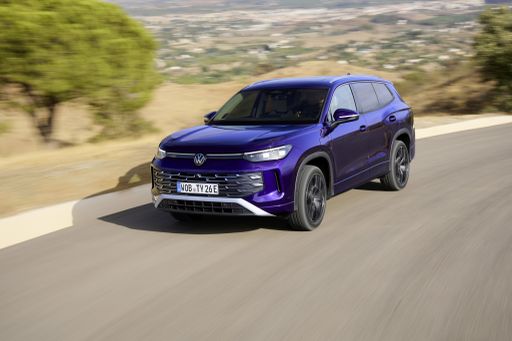 @ Volkswagen AG / VW Media
@ Volkswagen AG / VW Media
VW Tayron
Costs and Consumption
View detailed analysis
Engine and Performance
View detailed analysis
Dimensions and Body
View detailed analysis
Alfa Romeo Stelvio
The Alfa Romeo Stelvio combines Italian artistry with sporty performance, making it a standout in the SUV market. Its dynamic design captures the essence of elegance and agility, while the interior offers a driver-focused experience that enhances every journey. With a perfect blend of luxury and power, the Stelvio is ideal for those seeking both style and substance on the road.
details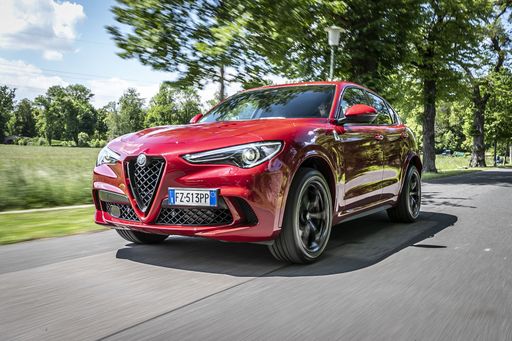 @ Alfa Romeo / Stellantis Media
@ Alfa Romeo / Stellantis Media
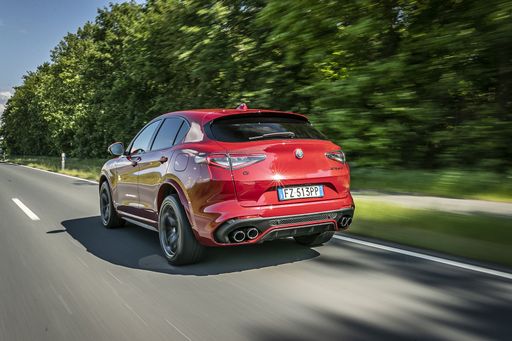 @ Alfa Romeo / Stellantis Media
@ Alfa Romeo / Stellantis Media
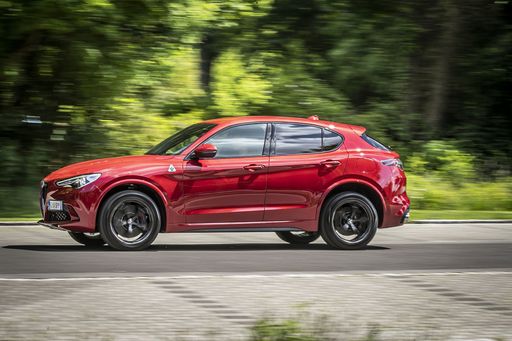 @ Alfa Romeo / Stellantis Media
@ Alfa Romeo / Stellantis Media
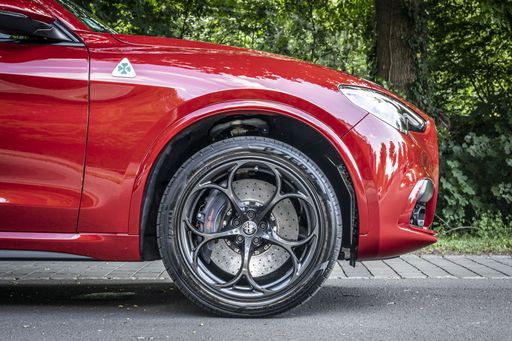 @ Alfa Romeo / Stellantis Media
@ Alfa Romeo / Stellantis Media
 @ Alfa Romeo / Stellantis Media
@ Alfa Romeo / Stellantis Media
VW Tayron
The VW Tayron is Volkswagen's roomy, no-nonsense SUV that pairs clean, familiar styling with a practical cabin built for families and everyday use. It rides comfortably, packs sensible tech and creature comforts, and feels like the sensible sweater of SUVs for buyers who prefer steady value over headline-grabbing drama.
details @ Volkswagen AG / VW Media
@ Volkswagen AG / VW Media
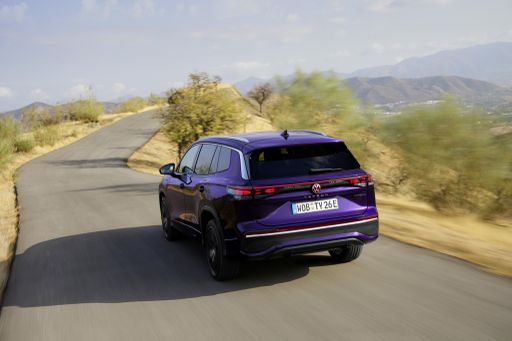 @ Volkswagen AG / VW Media
@ Volkswagen AG / VW Media
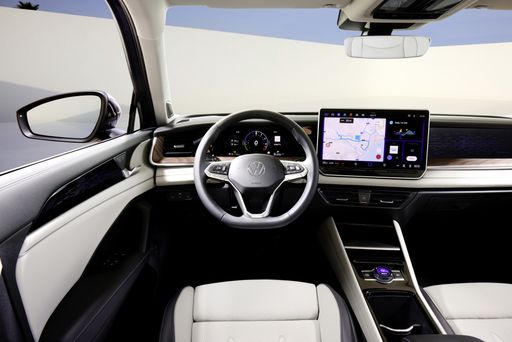 @ Volkswagen AG / VW Media
@ Volkswagen AG / VW Media
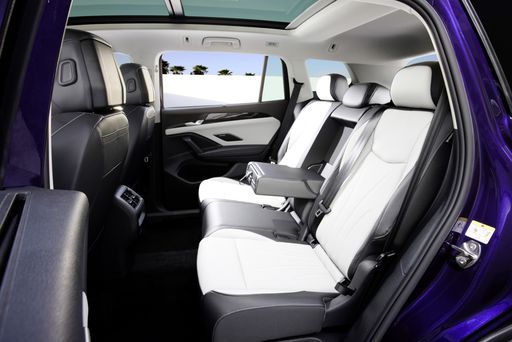 @ Volkswagen AG / VW Media
@ Volkswagen AG / VW Media
 @ Alfa Romeo / Stellantis Media
@ Alfa Romeo / Stellantis Media
|
 @ Volkswagen AG / VW Media
@ Volkswagen AG / VW Media
|
|
|
|
Costs and Consumption |
|
|---|---|
|
Price
51900 - 60900 £
|
Price
39600 - 53300 £
|
|
Consumption L/100km
6 L
|
Consumption L/100km
1.5 - 8.5 L
|
|
Consumption kWh/100km
-
|
Consumption kWh/100km
-
|
|
Electric Range
-
|
Electric Range
116 - 123 km
|
|
Battery Capacity
-
|
Battery Capacity
19.70 kWh
|
|
co2
157 g/km
|
co2
33 - 192 g/km
|
|
Fuel tank capacity
58 L
|
Fuel tank capacity
45 - 58 L
|
Dimensions and Body |
|
|---|---|
|
Body Type
SUV
|
Body Type
SUV
|
|
Seats
5
|
Seats
5
|
|
Doors
5
|
Doors
5
|
|
Curb weight
1820 kg
|
Curb weight
1682 - 1948 kg
|
|
Trunk capacity
525 L
|
Trunk capacity
705 - 885 L
|
|
Length
4687 mm
|
Length
4792 mm
|
|
Width
1903 mm
|
Width
1853 - 1866 mm
|
|
Height
1693 mm
|
Height
1666 - 1668 mm
|
|
Max trunk capacity
1600 L
|
Max trunk capacity
1915 - 2090 L
|
|
Payload
590 kg
|
Payload
489 - 566 kg
|
Engine and Performance |
|
|---|---|
|
Engine Type
Diesel
|
Engine Type
Petrol MHEV, Diesel, Petrol, Plugin Hybrid
|
|
Transmission
Automatic
|
Transmission
Automatic
|
|
Transmission Detail
Automatic Gearbox
|
Transmission Detail
Dual-Clutch Automatic
|
|
Drive Type
All-Wheel Drive
|
Drive Type
Front-Wheel Drive, All-Wheel Drive
|
|
Power HP
210 HP
|
Power HP
150 - 272 HP
|
|
Acceleration 0-100km/h
6.60 s
|
Acceleration 0-100km/h
6.1 - 9.7 s
|
|
Max Speed
215 km/h
|
Max Speed
204 - 240 km/h
|
|
Torque
470 Nm
|
Torque
250 - 400 Nm
|
|
Number of Cylinders
4
|
Number of Cylinders
4
|
|
Power kW
154 kW
|
Power kW
110 - 200 kW
|
|
Engine capacity
2143 cm3
|
Engine capacity
1498 - 1984 cm3
|
General |
|
|---|---|
|
Model Year
2024 - 2025
|
Model Year
2025
|
|
CO2 Efficiency Class
F
|
CO2 Efficiency Class
E, F, G, B
|
|
Brand
Alfa Romeo
|
Brand
VW
|
What drivetrain options does the Alfa Romeo Stelvio have?
The Alfa Romeo Stelvio is available as All-Wheel Drive.
The prices and data displayed are estimates based on German list prices and may vary by country. This information is not legally binding.
